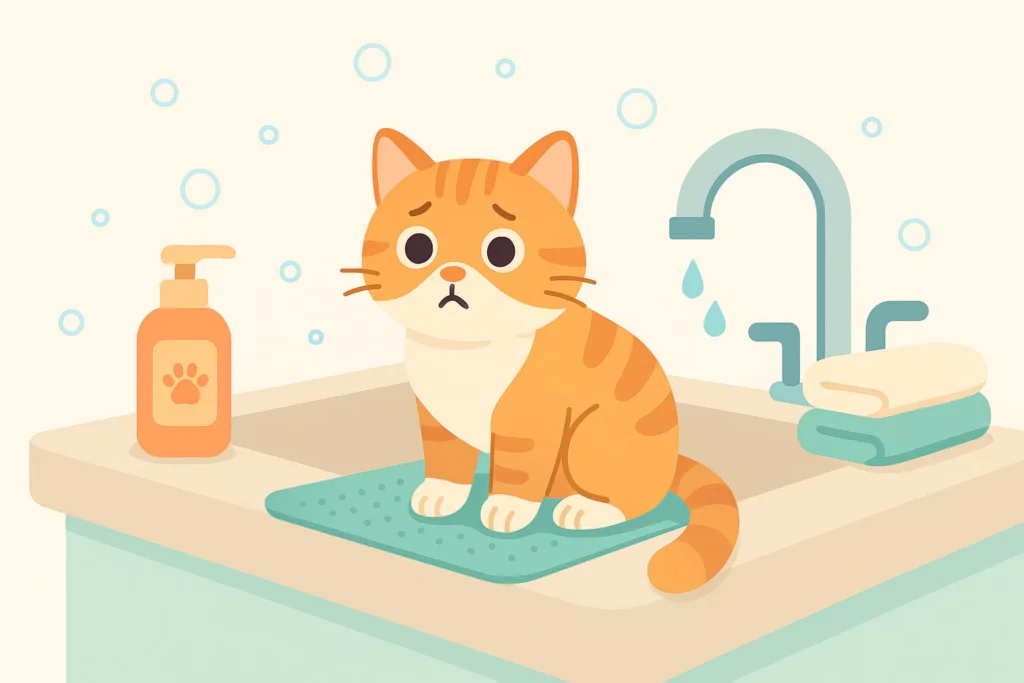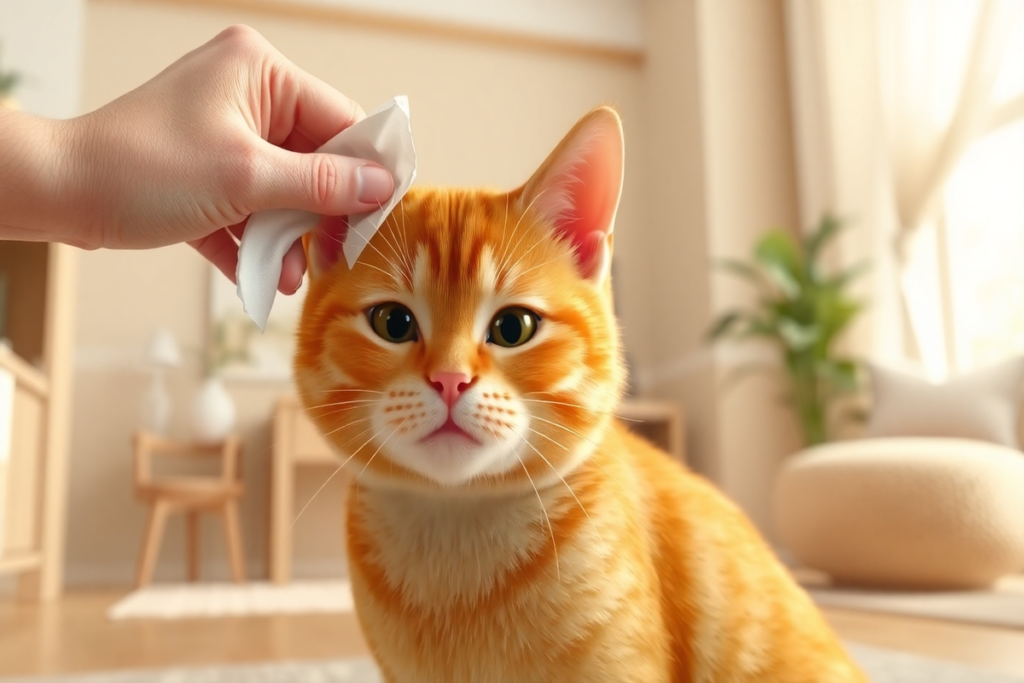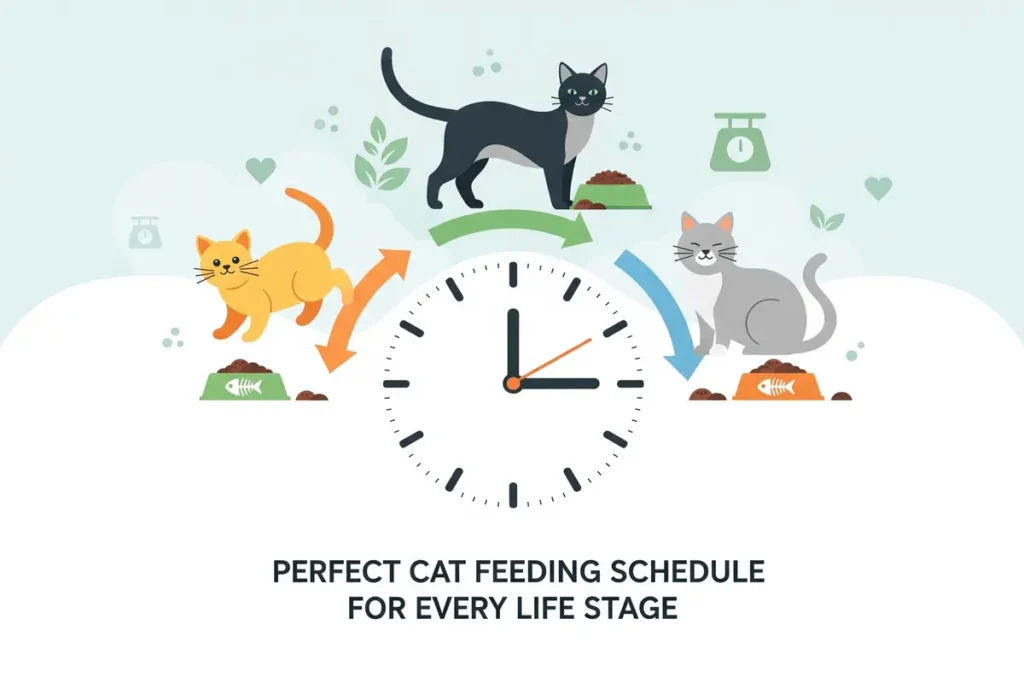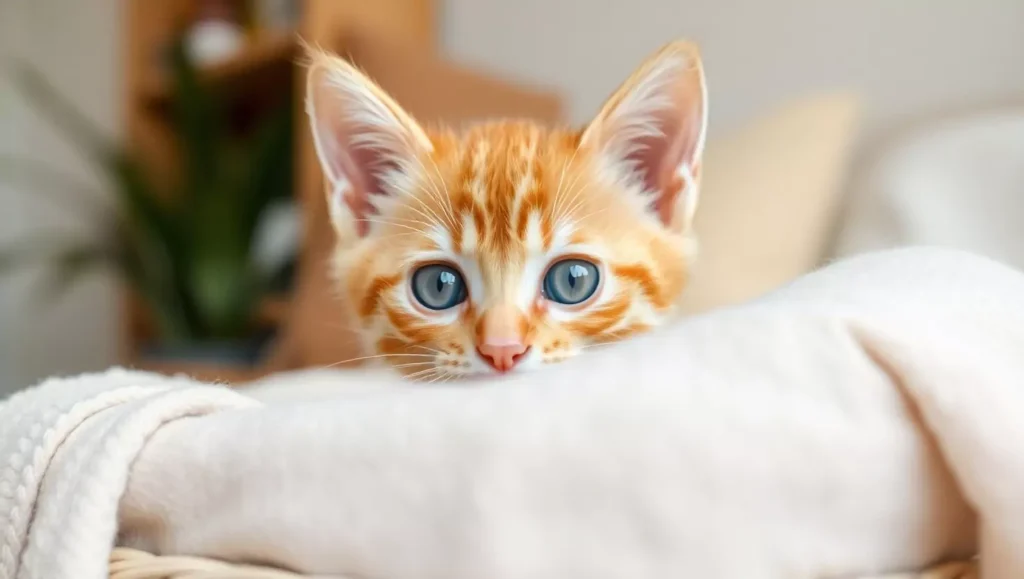We all want our cats to live long, healthy lives, right? Just like humans, they need regular examinations to maintain their health as well.
It doesn’t matter whether your feline friend is a playful kitten or a senior cat that is starting to slow down – regular examinations by a veterinarian are important.
Let’s explore how often your cat should visit the vet and why it is so important for their health at any stage of life.
In this guide, we will cover the following:
- How often cats should visit the vet at all stages of their life
- The important health checks and vaccinations they need
- Urgent health care signs, and when we need to get the cat to the vet
- Ways to minimize the stress caused when taking your cat to the vet
- Budgeting for lifelong care for your cat.
Number of Vet Visits in a Cat’s Lifetime
Checking how often you need to visit the vet with your feline companion will depend on some things: Breed, age, lifestyle, and health. For example, outdoor cats are more likely to experience accidents or infections because of their lifestyle, so they may need more frequent visits to the vet than indoor cats.
Indoor cats may end up living longer, but it doesn’t mean that they don’t need regular check-ups from a vet to prevent underlying health issues from emerging.
How often your cat sees the vet will depend on:
- Age (kitten, adult, senior)
- Lifestyle (indoor, outdoor)
- Breed & Health History (certain breeds are susceptible to specific conditions)
As a general rule:
- At least once a year for healthy adult cats
- More frequent visits for kittens and seniors & those cats with health issues
All cats, regardless of age or lifestyle, should have at least one annual vet visit to make sure they stay healthy, but here we will discuss how to check the frequency by life stage.
Year-by-Year Recommendations for Cat Checkups

Kittenhood (0–1 Year): Frequent Checkups & Vaccinations
Young kittens grow rapidly and require careful consideration to make sure they are developing properly. Kittens will need to go to the vet every 3-4 weeks for their first year of life.
It may seem like a large number of appointments, but it is important that your vet sees your kitten for his or her vaccinations and parasite treatments and gives you the latest growth checks.
Kittens will require monthly vet visits during their first year of life for:
- Core vaccinations (FVRCP vaccine, rabies, Feline Leukemia vaccine)
- Deworming & parasite prevention (fleas, ticks, and worms)
- Spaying/Neutering (usually at 5-6 months old)
- Nutrition & Growth monitoring
Vaccination schedule:
- 6-8 weeks: Kitten’s First Exam and FVRCP shot for shielding against feline viral rhinotracheitis, Feline Calicivirus, and Feline Panleukopenia.
- 10-12 weeks: Booster shots.
- 14-16 weeks: Final kitten booster shots and rabies vaccine.
Planning for spaying or neutering should also be planned during this time and can happen between 5-6 months of age. Spaying or neutering is beneficial not only for eliminating unwanted litters of kittens, but it can reduce health problems later on.
Early Adulthood (1–5 Years): Annual Wellness Exams and Preventive Care
However, once a cat turns one year old, they are officially an adult cat. During the adult cat stage, cats will need to visit the vet each year for a full wellness exam.
Even if your cat appears to be in perfect health, an annual wellness exam is important. During the exam, your vet should check for early signs of diseases, as well as determine if your cat’s vaccinations are current.
An adult healthy cat should visit the vet annually for:
- Physical examination (weight, coat, teeth, heart, lungs)
- Vaccine boosters (if needed)
- Dental Care check-ups (to help prevent gum disease)
- Parasite control (year-round flea & tick prevention)
Healthy adult cats will typically only require annual veterinary care visits. However, your vet will also look at things like dental care (cats easily get dental issues), and your vet will recommend appropriate parasite protection products, which could include flea, tick, and worm control. This is important because if we can prevent small issues, then we do not have to deal with bigger issues later.
Prime Adulthood (5–10 Years): Regular Checkups and Disease Screening
When your cat reaches middle age, the importance of routine wellness exams will become increasingly important. This won’t change your yearly exams, but at this point, your veterinarian may start to see if there are the earliest signs of disease related to chronic health problems (kidney disease, thyroid dysfunction, or arthritis).
This is a very sneaky time for chronic health problems – they often go unnoticed because the signs and symptoms can sometimes be subtle. Catching these problems early can be very beneficial. Cats in Middle-age should continue with annual check-ups, but in addition to the physical check-up, your vet may recommend:
- Blood work (probably kidney, liver, or possibly thyroid function testing)
- Urinalysis (to check for diabetes or kidney disease)
- Blood pressure check (hypertension is a relatively common problem in geriatric cats)
- Dental cleanings (if there are clear signs of tartar or gum disease)
Your veterinarian may want to see you for a basic dental cleaning since dental disease is common in cats at this age. Don’t forget oral health is essential for your cat’s physical health and well-being!
Senior Cats (10+ Years): Bi-Annual Vet Visits
When your pet reaches the age of 10, it will be formally considered a senior patient. The most important thing is that your senior cat will need to consult the vet more often (every 6 months at the very least).
At this point in your cat’s age, the vet will be doing a more thorough evaluation than at 1 year, including blood tests, urinalysis, and blood pressure readings to check for common infectious diseases like kidney disease, hyperthyroidism, or high blood pressure.
Older cats should have check-ups every 6 months to assess for:
- Arthritis & mobility difficulties (joint pain)
- Weight loss/gain (which can be a sign of thyroid or kidney problems)
- Dementia or cognitive decline
- Heart disease and organ function (to help with the early detection of chronic diseases)
You can also expect the vet to use these check-up appointments to look for any signs of degeneration in joint health—as arthritis can really flare up for older cats. Scheduling regular check-ups can help your senior pet feel as comfortable as possible and help manage age-related issues proactively.
Taking a Proactive Approach to Your Cat’s Health
Because cats aren’t able to tell us when something’s wrong, it’s important we keep track of our cats. Regular vet visits not only help establish a routine but are also helpful in keeping track of any change in your cats’ behavior and routine. This more proactive approach ensures your furry friend’s overall health.
Signs Your Cat’s Requires Immediate Visits to the Vet
Even with routine exam appointments, it’s important to keep an eye out for any sudden changes that may indicate a serious health concern for your cat. Cats are masters at masking pain, so noticing symptoms early can make all the difference. Make sure to look out for these warning signs:
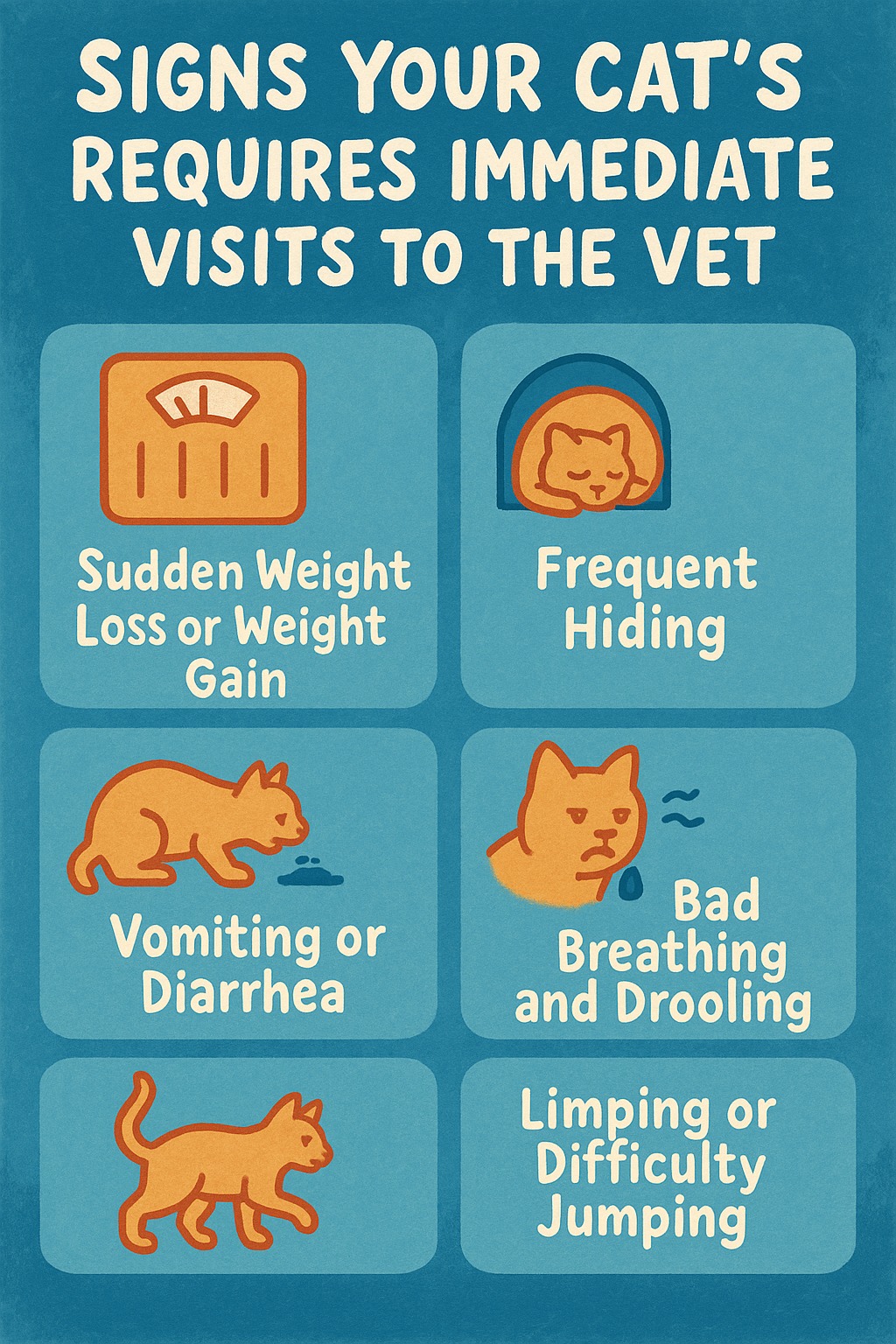
Sudden Weight Loss or Weight Gain
A sudden and unprecedented change in your cat’s weight (without an apparent reason, such as a diet change) can signify something much more serious. Conditions such as diabetes, hyperthyroidism, or even cancer can cause weight loss or gain in felines.
Lethargy or Increased Amount of Hiding
If your cat has generally had a good disposition or is playful and suddenly becomes unusually tired or is hiding more often, it could be in pain or unwell. Behaviors and habits can change when cats experience things like infections, injuries, or serious internal problems.
Vomiting or Diarrhea Lasting 24 Hours or More
It’s not unusual in some cases for cats to vomit occasionally. However, if your cat vomits for a long time or if it is vomiting and has diarrhea for more than 24 hours, then that can signify poisoning, infections, or digestive issues that require emergency care.
Bad or difficult urination or blood in urine
Straining to urinate, crying out while using the litter box, or seeing blood in your cat’s urine are very serious red flags to look for vis-à-vis urinary tract infections, blockages, or kidney problems that may become lethal if left untreated.
Bad breathing and drooling
When a cat has bad breath, drooling, and a hard time even eating, this could be an indication of tooth decay or dental disease (not difficult), an infection (again not difficult), or possibly kidney or other organ failure, as an example. Difficulty breathing is especially concerning and requires immediate attention. While dental disease is painful for all those involved, it is especially painful for your cat and can compromise your cat’s overall health.
Limping or difficulty jumping
If your cat suddenly has trouble or is unable to jump onto the couch or get around the house or outside very well, this could be a sign of arthritis, injuries, or possibly neurological problems. Getting your cat diagnosed early will give your pet the best chance to live comfortably with the least amount of pain and mobility loss.
Pro Tip: Cats have a natural instinct to hide signs of illness. Therefore, even the most gentle behavior changes, like unexplained aggression, clinginess, withdrawal, or excessive verbalization, are not to be ignored; this may be their way of letting you know something is wrong.
If you’re unsure, it’s always better to be safe than sorry and contact your veterinarian at your local Animal Hospital. The sooner you act often means a quicker recovery and a happier, healthier cat.
Understanding Typical Health Problems in Cats by Age
Young Cats
Kittens are full of energy, but they can also wind up in accidents or encounter health conditions associated with growing, including developmental issues or infections. Regular check-ups will ensure you’ll catch the problems before they become big.
Older Cats
As your cat gets older, they may develop chronic conditions such as arthritis, diabetes, or kidney disease. Senior cats are also at risk for dental disease or weight problems, and keeping up with vet visits is important to managing their comfort and health.
Observing Changes in Behavior, Appetite, and Litter Box Habits
Even with regular vet check-ups, pet owners should pay attention to any behavior changes in their cats. If they show a sudden lack of interest in their food, refuse to use the litter box properly, or become lethargic, these may all be indications of a health problem. The sooner they go to the vet, the better!
Early Detection and Prompt Veterinary Attention
Consistent vet visits are great because, oftentimes, health issues are identified before they advance.
With many serious medical conditions (like kidney disease or hyperthyroidism), if caught early, they can be managed with proper medical advice and treatment. This is why keeping your cat’s yearly check-ups on time is important; it allows your vet to provide an accurate diagnosis of your pet and identify problems before they become costly or dangerous issues.
Similarly, dental health needs early intervention. Cats can experience painful dental decay, and neglected dental health issues can lead to infection or even organ damage. Don’t skip yearly cleanings! Additional diagnostic tests may be recommended based on your cat’s specific needs.
How to Prepare Your Cat Before a Vet Visit
For a lot of cats, going to the vet can be a stressful experience. But don’t worry! Pet parents can do things to help make the trip smoother for both you and your cat.
Get your cat familiar with the carrier
Keep the carrier out all the time so your cat can become familiar with it. You can even try feeding your cat inside of the carrier to make it a positive place for them.
Stress of the car ride
If your cat gets stressed in the car, try to keep the car ride as uneventful as possible. You can play soft music in the car and cover the carrier with a light blanket.
Stay calm
Cats are very aware of our emotional states and can sense our stress. If you remain calm, your cat is more likely to follow suit.
Budgeting for Lifelong Vet Visits
Vet visits can definitely add up over the years, especially if your cat requires special care or special treatments. Many veterinary practices offer preventive care products and wellness packages to help manage costs.
You can plan ahead in many different ways to alleviate some of the expenses associated with a vet visit. You might consider putting aside a little money each month for vet visits. If it helps, you can look into pet insurance and cover some of the emergency costs that you may incur.
Remember that preventative care can actually save you money. By taking your cat to the vet regularly, you are able to catch issues sooner and not pay for expensive treatments because you waited until it was too late.
Following the American Animal Hospital Association guidelines for required vaccines and rounds of vaccinations helps ensure comprehensive protection.
Conclusion
Taking care of your cat’s health is a life-long commitment, and vet visits are one of the most important parts of keeping your cat happy and healthy! Regardless of whether you’re raising a lively kitten, a playful adult cat, or an elderly regal cat, routine check-ups with the vet will give you an excellent opportunity to see how your cat is doing and to address any emerging health issues before they become crucial.
So, go ahead and keep those appointments for your furry friends, and you can expect many more happy years of purring, hugs, and snuggles!

